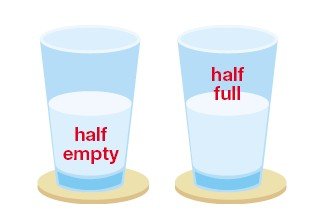
The way you label things is a reflection of the way you think about things — but also can control the way you think about things.
Consider an example. “I have/suffer from depression.” There’s a world of difference between the implications of this statement or a different statement: “I look at the world as a glass half-empty.”
The second statement implies some ownership or responsibility for the problem. The first statement implies the problem was inflicted on you, perhaps by others or more likely by genetics/biology. The point of the first statement is: Something or someone else is responsible.
Conventional wisdom holds that it’s humane and kind to go with the first approach, and cruel or unfair to imply self-responsibility.
But this conventional “wisdom” denies the fact that the way we feel is, quite literally, a reflection or extension of the way that we think. In other words, we are what we think. And what we think “prints out” in the form of emotions.
This is not unfair or unkind blaming. It’s simply a recognition of fact. It’s also more hopeful than the passive approach. If you passively assume, “I suffer from emotional disease, and someone must fix it for me,” you’re — right from the starting gate — at war with actual facts. Nobody can get into your head or mind and change your thoughts for you. It’s possible that altering the chemistry of the brain (provided you’re willing to engage in educated guesswork with the psychiatrist) will help; but even then, the point of the help is to enable you to change your thinking to a more reasonable course. You cannot escape thinking or reason, no matter what you do with your body and your brain. There’s always a self-generating part.
The world is full of people, particularly educated or sophisticated types, who like to feel more viable or important by encouraging passivity in you. The therapy field is full of this type, as are most of the educated, influential, powerful and “chattering” classes. Their membership in this elite does not automatically make them right. And their seeming concern — if not fawning desire — to ensure your best interests does not automatically mean that your interests will be met by listening to them.
To me, it makes infinitely more sense to look at your habits of thinking as the causes of your problems, not only because it’s true — but it also implies the solution is in your hands.
The medicalization of emotions has been more cruel than any campaign in favor of self-ownership or self-responsibility ever would have been. Self-ownership leads to an attitude of, “I can and should change what I can.” The medicalization of emotions has led to a widely perceived belief that, “I must be treated or fixed in order to be causelessly happy.”
There’s no such utopia, and a world of causeless emotions — all directed by the proper neurochemicals in the brain being in their proper place — would not be an ideal place. We’d all be nothing but conforming robots. Conformity to reality is one thing. That’s always a rational and life-sustaining road to take. But conforming to others — merely because they are others, and the goal is to “fit in” — is the precise opposite of what mental well-being requires. Mental well-being is a state of confidence and self-esteem. Most agree on that much. But most don’t understand that self-esteem means, first and foremost, esteem in one’s mind as the means of surviving and living. If you assume that something or someone else will take care of your mind for you, then you have abdicated control and responsibility over the very core of what self-esteem most fundamentally depends upon!
Depression, properly defined, is a state of “learned helplessness.” This term arose out of the research of Martin Seligman and others. Ironically, the medicalization of emotions reinforces the very state of depression it’s supposed to “treat.” It tells you, “You’re not responsible for your emotional state. Something else is. And once treated, while you sit and wait, you will be fine.” To me, this seems like a cruel and twisted joke. You tell the person whose emotional state is dominated by “I can’t do anything to change myself” by claiming, in effect, “You can’t do anything to change yourself.”
Try to fight what the established world — even the established world of mental health and self-help, unfortunately — tries to tell you. Get past these notions of “I suffer from” this or that “mental disorder.” Instead, look objectively at what your mind is actually saying and doing. Look at what your attitude is, and whether your attitudes or beliefs are fact-based or not, or require changing. Find someone to help you? Surely, if it’s needed. But find someone to help you at this task. Don’t find someone to “help” you merely look at yourself as a weak, helpless creature subject to whatever disease of emotions you happened to inherit. That’s not really the way it is.
Be sure to “friend” Dr. Hurd on Facebook. Search under “Michael Hurd” (Rehoboth Beach DE). Get up-to-the-minute postings, recommended articles and links, and engage in back-and-forth discussion with Dr. Hurd on topics of interest.
